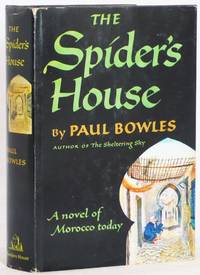
Paul Frederic Bowles was an American expatriate composer, author, and translator. He became associated with the Moroccan city of Tangier, where he settled in 1947 and lived for 52 years to the end of his life.

The Golden Bowl is a 1904 novel by Henry James. Set in England, this complex, intense study of marriage and adultery completes what some critics have called the "major phase" of James's career. The Golden Bowl explores the tangle of interrelationships between a father and daughter and their respective spouses. The novel focuses deeply and almost exclusively on the consciousness of the central characters, with sometimes obsessive detail but also with powerful insight.

Colm Tóibín is an Irish novelist, short story writer, essayist, journalist, critic, playwright and poet.
A Distant Episode is a short story by Paul Bowles. Written in 1945, it was first published in the Partisan Review and republished in New Directions in Prose and Poetry, #10 in 1948. It is also the title piece in a 1988 collection of Bowles's short stories, A Distant Episode: Selected Stories by Ecco Press.

Up Above the World is a novel by Paul Bowles first published in 1966 by Simon and Schuster and in Great Britain by Peter Owen Publishers in 1967. Up Above the World was the last of Bowles’s four novels.
Allal is a short story by Paul Bowles written in Tangiers in 1976 and first published in the January 27, 1977, issue of Rolling Stone. It appeared in his short fiction collection Things Gone and Things Still Here (1977) published by Black Sparrow Press.

The Delicate Prey and Other Stories is a collection of 17 works of short fiction by Paul Bowles, published in 1950 by Random House.
The Delicate Prey is a piece of short fiction by Paul Bowles, written in 1949 and first published that year in Paris by the small literary journal Zero. In 1950, Random House presented the story in the collection of Bowles’s short fiction, The Delicate Prey and Other Stories. This short story is considered one of Bowles' most outstanding and controversial works of fiction.
Tapiama is a short story by Paul Bowles first published in the collection of his short fiction in The Hours After Noon by the Heinemann press in 1959. The story was subsequently published in A Distant Episode: The Selected Stories by Ecco Press in 1988.
The Echo is a short story by Paul Bowles written in 1946 and first published in the September 1946 issue of Harper's Bazaar magazine. It was later published in a collection of his short fiction, The Delicate Prey and Other Stories, published by Random House in 1950.
You Are Not I is a short story by Paul Bowles written in 1948 and first published the collection of his short fiction The Delicate Prey and Other Stories (1950) by Random House.

The Spider’s House is a novel by Paul Bowles and first published by Random House in 1955.

The Time of Friendship is a collection of 13 works of short fiction by Paul Bowles published in 1967 by Henry Holt and Company. A number of the stories included in this volume appeared earlier “in various places during the 1950s and 1960s.”

A Hundred Camels in the Courtyard is a collection of short fiction by Paul Bowles published by City Lights Books in 1962. The volume was the first collection of his works published in the United States since The Delicate Prey and Other Stories (1950).
Tea on the Mountain is a short story by Paul Bowles. Written in 1939, the story first appeared in the 1950 collection The Delicate Prey and Other Stories published by Random House.
The Hours After Noon is one of 13 works of short fiction by Paul Bowles included in The Time of Friendship (1967) by Henry Holt and Company.
The Garden is a short story by Paul Bowles written 1950. It was first published in the Autumn–Winter 1964 issue of Art & Literature (Lausanne). It later appeared in his short fiction collection The Time of Friendship (1967) published by Henry Holt and Company. Bowles completed the story in Asilah, Morocco. At only three pages The Garden, the briefest of Bowles’s short fiction, is one of three fables that appear in the volume. The other two are “The Hyena” and “The Successor”. The story serves to challenge “the moral legitimacy of established religion, in this case Islam.”

Things Gone and Things Still Here is a collection of nine works of short fiction by Paul Bowles, published in 1977 by Black Sparrow Press. The volume is the sixth collection of Bowles’s work, much of which is re-published material.
"You Have Left Your Lotus Pods on the Bus" is a short story by Paul Bowles written in Tangiers in 1971 and first published in his short fiction collection Things Gone and Things Still Here (1977) by Black Sparrow Press.